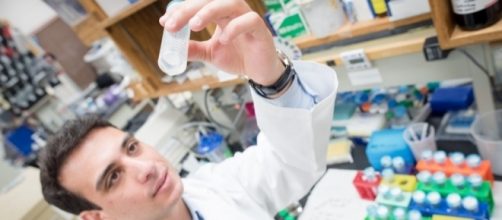Male contraception has reached another level with a new, experimental gel that blocks sperm flow. In a recent trial, the contraceptive, named Vasalgel, was used successfully to prevent pregnancy in a group of monkeys. Based on the optimistic results of the study, scientists want to begin human testing of the contraceptive gel within the next couple of years.
Reversible male contraception.
Vasalgel is a non-hormonal, injectable polymer that creates a gel barrier in the tubes that sperm use to enter a male’s semen. While sperm is blocked, other fluids are not.
The gel wall can be taken done by flushing the material out with a sodium bicarbonate solution, making the process potentially reversible.
Passed the monkey test.
Vasalgel was tested on 16 adult male rhesus monkeys. After being injected with the polymer, the monkeys were released into their enclosure that included several fertile females. While being monitored for two breeding seasons, scientists at the California National Primate Research Center noted that mating did occur in the population, but no females became pregnant. Normally, 80 percent of the females conceive during a breeding season, which lasts from September to May.
Minor complications.
Three of the male monkeys experienced side effects, and one had to undergo surgery to repair a damaged tube.
Unrelated to the conceptive gel trial, another monkey had to be partially castrated due to a fight with a different monkey, likely caused by the competitive nature of males during the breeding season.
Limited male contraceptive options.
Current male contraceptive methods are limited to essentially two options, vasectomy and condoms. With vasectomies mostly permanent and condoms unreliable, there is a high demand for an alternative male birth control method that is not only long acting, but also reversible. Most surveys indicate a majority of men would be open to trying a new contraceptive if one was available.
Human testing to start.
In order to start experiments in men, Parsemus Foundation, the non-profit organization that funded the two-year trial, will seek regulatory approval for human testing.
The first studies will evaluate Vasalgel’s effectiveness in preventing pregnancy. The second set of studies will determine if the process is reversible. Previous studies done with rabbits found the contraceptive gel can be safely removed without complications.
Other experimental contraceptive options.
Vasalgel is not the only new injectable conceptive method being tested. Another clinical trial is going on right now to study the effectiveness of hormonal shots. So far, hormonal shots have shown to block sperm production in 96 percent of the men who completed the trial. Yet, due to some adverse side effects, the shots will likely be reformulated and retested.
A revolution in birth control
If the contraceptive gel is found to be safe and efficient, it will be the first new method of male contraception in nearly a century. While Parsemus is helping fund the previous and future trials, Revolution Contraceptives LLC is the company that developed Vasalgel.

